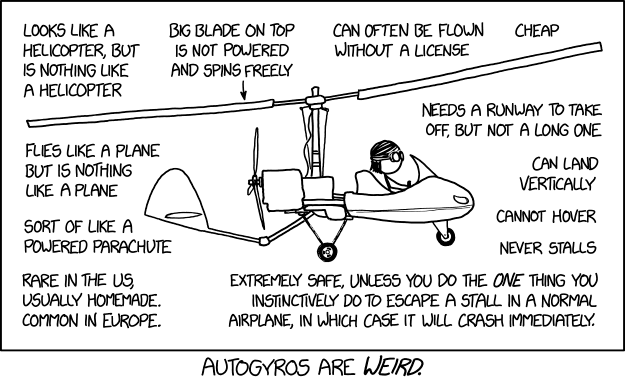The TF-G1 autogyro created by ThunderFly s.r.o. is a unmanned aerial vehicle (UAV) designed to be operable in almost any weather. The main features of that design are:
- Payload capacity of a few kilograms
- Weather-insensitive operation
- Low audible noise
- High safety due to stable autorotation mode which does not require autopilot or pilot attention
- Greater altitude and area coverage than existing UAV designs like multi-copters or helicopters
- High maneuverability and agility
- Absence of downwash, therefore a minimal occurrence of Brownout
- High descent rates
- Simulation model available
- Easily repairable and maintain
- Exceptional flight tolerance to rotor blade damage
- Car roof takeoff ready
The benefits that come from this feature set are the usability of applications where the system could be potentially damaged, although the safety must remain as high as possible. An example of this application is searching and rescue missions in harsh weather unflyable by conventional aircraft. For additional information contact ThunderFly s.r.o. representative at info@thunderfly.cz
In contrast to the well-known VTOL aircraft designs. The autogyro could be considered a short take-off and vertical landing aircraft (STOVL). Therefore it is suitable for a wide range of different applications. The main advantages to other well-known airframes:
- Ability to take off and land using a short runway (almost zero length).
- High resistance to weather conditions, especially gusts of wind or thermals.
- An unpowered rotor enables it to operate in an autorotation mode (one of the helicopter’s emergency modes). Consequently, it does not need to actively change a flight mode in case of failure (it does not need a parachute or other actively working devices). Its flight is thus inherently stable and safe at all times.
- Autogyro has significantly reduced audible noise due to the slowly rotating rotor and propeller.
- Absence of a downwash - during take-off or landing the creation of an unwanted swirling of dust is eliminated.
- Low lift-to-drag ratio that can be adjusted by construction parameters. This ability can be useful because an unmanned autogyro cannot fly very far in the case of control failure (as is the case of a conventional airplane), the flight is still safe and the autogyro cannot fall (as is typical for multi-copters or wrongly piloted helicopters).
The autogyro has generally many construction variants. The one, which is in the scope of this repository has a fully tilted rotor. The main advantage of this construction feature is obtaining better controllability over its wide airspeed range. It can also be controlled down to zero forward airspeeds, compared to a classical rudder/elevator setup.
This repository contains open-source design files of the autogyro construction. Most components are 3D-printed. However, the printable data (gcodes) are generated by our special software suite - processor3D. It is required that parts are sliced properly according to the material to make sure that resulted in 3D-printed parts can be used safely for the flight. Therefore for safety reasons we do not recommend attempting to slice the parts yourself. It is better to contact us.
The product, support, or accessories could be obtained from ThunderFly s.r.o., via an email to info@thunderfly.cz .
In case you want to contribute to the open-source project we have a contribution guideline. Your contribution is very welcome! For a contribution, you can get access to the optimized and safe printable files (gcodes).
Most of the components are coded in OpenSCAD. To render all components run the following commands in Linux CLI:
sudo pip install stlsort
sudo apt install python3-numpy-stl
make
The design files and related documents are covered by GNU GENERAL PUBLIC LICENSE Version 3

